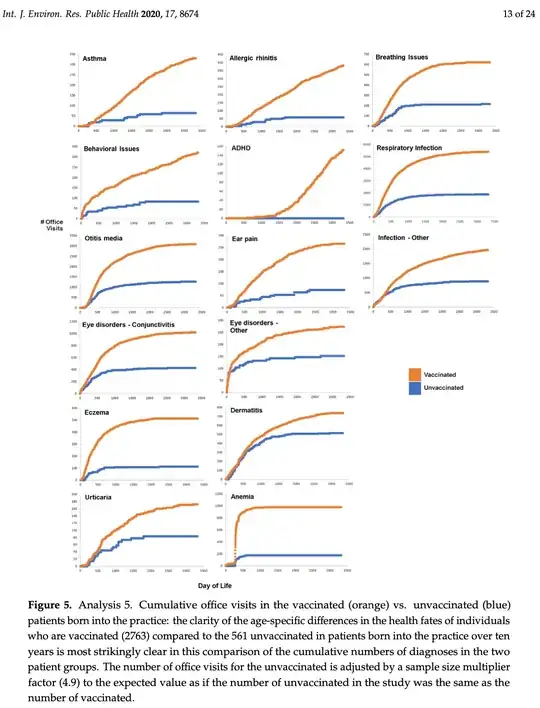David Gorski has some (updated) comments about the methodology of the study such as:
The authors claim that RIOV “reflects the total number of billed office visits per condition per group, reflecting the total disease burden on the group and the population that it represents,” but no good analysis or references are provided to show that RIOV does, in fact, correlate with disease burden, particularly when using billing data.
[...] because it is billing records being analyzed, it is impossible to know how many emergency room visits there were in each group or how many unbilled telephone calls were received from parents of children in each group. At least, these measures cannot be determined without a chart review, which appears not to have been done.
And because the data comes from the 2nd author's own clinic...
there’s likely to be ascertainment bias, which is the systematic distortion in measuring the true frequency of a phenomenon due to the way in which the data are collected. How could this happen? Think about it. Dr. Thomas believes that vaccines cause autism. That right there introduces unconscious bias that could affect how likely he and his staff are to investigate subtle signs of autism and refer out to for evaluation based on vaccination status and how likely he is to ascribe various diagnoses to “unvaxxed” children compared to “vaxxed” children. One can easily imagine this bias leading to unvaccinated children to be less likely to be given an autism diagnosis than vaccinated children or to be—dare I say?—brought in to the office as often for various conditions that Dr. Thomas attributes to vaccines.
Gorski also has some comments about the official Oregon Medical Board allegations against study co-author Thomas, regarding the practice from which the data apparently came:
It turns out though, that if the following allegations recounted in the Board’s order are true, Dr. Thomas is not so respectful of parents who are pro-vaccine and want the standard vaccine schedule:
3.2 Licensee is insistent and direct in his communication with parents and guardians that they should accept his alternative vaccine schedule.
What does the Board mean by that? It provides two examples:
3.2.1 A patient’s mother sought subsequent treatment by Provider X after having been “reduced to tears” by Licensee’s “bullying” her into his personal vaccine schedule against her express wishes for full vaccination for her child.
3.2.2 Patient A’s mother requested polio and rotavirus vaccinations for Patient A according to CDC Recommendations, but Licensee did not have those vaccines in the clinic, and Patient A would therefore not be able to get them. Patient A’s mother reported that the Licensee questioned why she wanted Patient A to get the polio vaccine and asked whether they were traveling to Africa. During the appointment, Licensee continually connected vaccines (not specific) with autism. Licensee asked her how awful she would feel if Patient A got autism and she could have prevented it.
One cannot really have much confidence about the data gathered in such a setting...
And one point I've noticed in the paper itself is that it never seems to mention the word "hospital". In other words, it seems that all the billing hours are for the clinic itself, the rest are basically a zero-cost externality from the point of view of this study. Which brings us for instance to how this case might have been handled in terms of cost:
3.3.3 Patient D, a now 9-year-old male, was completely non-immunized. Patient D sustained a large, deep scalp laceration at home in a farm setting on August 8, 2017, and was treated with colloidal silver and with his parents suturing the wound independently. Patient D subsequently developed acute tetanus requiring intubation, tracheotomy, feeding tube placement and an almost two- month ICU stay at Doernbecher Children’s Hospital. Patient D was then transferred to Legacy Rehabilitation. Licensee saw Patient D for follow-up in clinic on November 17, 2017. Licensee’s notes documented a referral to a homeopath, recommendation of fish oil supplements, and “phosphatidyl seine.”
I mean, sure, there weren't many hours billed at the clinic itself, despite the two-month stay in the ICU at a hospital. So low RIOV in this case, no doubt.
The first author of this study, Lyons-Weiler, is also (more) mainstream-media famous for making various unsound claims, the most recent ones about Covid vaccines exaggerating the risks: "Lyons-Weiler’s number is more than 40 times too high" (according to Politifact.) Since we have some evidence how he presented/interpreted known data (on Covid-19 vaccines), one can only wonder how he might have processed data that is in itself hard to verify, such as that coming from Thomas' practice. (Earlier in the present pandemic, Lyons-Weiler also made unsound claims about the genetics of the Covid-19 virus itself.) His qualifications are discussed in vaccine court proceedings in which he was introduced as an expert witness on PANDAS, but the court largely rejected his credentials as irrelevant; there is some news coverage of that as well.
